How can we connect all MSMEs to the potential of online trade?
The Broadband Commission Working Group on Connectivity for MSMEs seeks to identify the challenges and opportunities of getting more micro-, small- and medium-sized enterprises (MSMEs) in low and middle income countries (LMICs) online and engaging in online trade. Co-chaired by Ms. Pamela Coke-Hamilton, Executive Director of the ITC, and Mats Granryd, Director General of the GSMA, core elements of the Working Group’s research was drawn from a major study by the GSMA on the digital and financial inclusion of female micro-entrepreneurs in Africa and Asia, supported by the Bill and Melinda Gates foundation, and work on digital connectivity and its economic usage by MSME in West Africa by ITC.
Through interviews with Working Group members and external experts, and extensive research into the barriers and enablers of MSME connectivity, the Working Group has developed a five part framework and four core recommendations for all stakeholders to play their part in enabling MSME connectivity.

Help close the data gap in MSME Connectivity
Share the ITC Digital Transformation Survey with your network
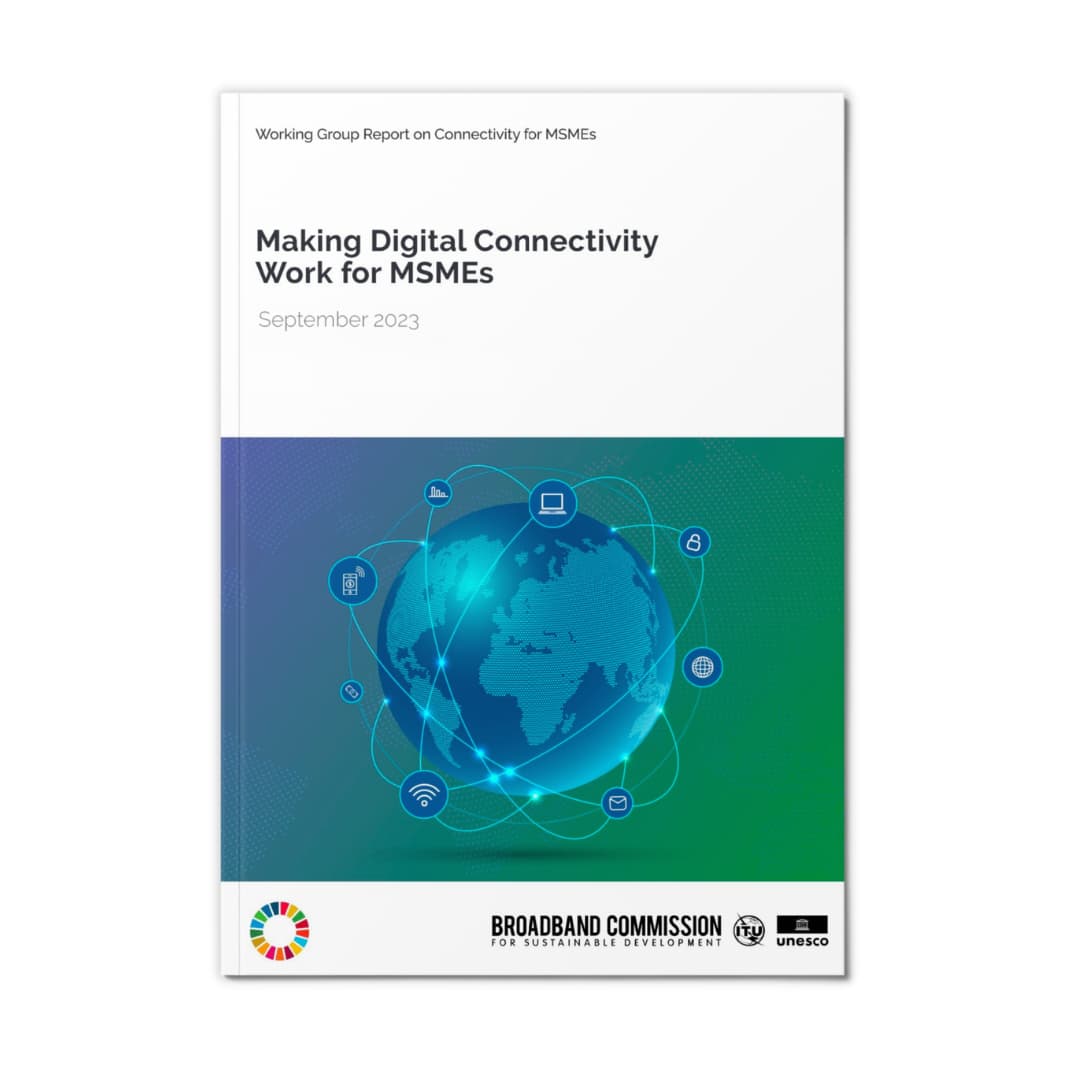
Working Group Outcome Report
Making Connectivity work for MSMEs

“When businesses, from the very largest to the very smallest, can use digital channels and tools to make money, then investments in connectivity will follow.”
Ms. Pamela Coke-Hamilton, ITC

“Considering the impact of MSMEs in low- and middle-income countries, improving their connectivity will be key to driving social and economic growth, and achieving the United Nations Sustainable Development Goals.”
Mr. Mats Granryd, GSMA
Setting the Stage
Connecting MSMEs is critical to sustainable and inclusive global development
Digital connectivity matters and its importance has accelerated since COVID-19. The good news in 2021 was that the number of digitally connected individuals rose sharply. However, there is an urgent challenge to connect the unconnected, nearly all in low-and middle-income countries (LMICs).
A priority should be MSMEs in these countries –key drivers of the economy and providers of employment –most of whom do not fully leverage digital connectivity to run their businesses and engage in trade. Increasing access and capability to use digital channels and tools could be one of the most powerful mechanisms to boost the resilience of small businesses in LMICs and ensure their contribution to achieving the SDGs.
Greater adoption of digital technology and participation of MSMEs in digital trade brings important economic benefits, drives the demand for digital capacity and in turn improves the business case for further investments in infrastructure: a virtuous cycle that can accelerate the expansion and improvement of connectivity.
Key Challenges
A framework to assess MSME connectivity in LMIC
In guiding our assessment and understanding of MSME connectivity, we devised a broad framework that takes into account the core elements of the UN imperative for universal and meaningful connectivity.

The Path Ahead
Working Group Recommendations
How can all stakeholders play their part in promoting MSME connectivity and removing connectivity barriers?
Governments should play a leading role by implementing policies and regulations that enable MSME connectivity. as many barriers to MSME connectivity are at the national level.
Companies can provide connectivity, devices, and many of the digital enablers, which should target the needs of MSMEs.
International organizations can further cooperate on the development and dissemination of best practices in policies to promote connectivity, digital transformation, and digital enablers.
NGOs and the technical community can help to advocate for increased connectivity. safety.security. skills training. and other enablers for the digital inclusion of MSMEs.
Further recommendations for all stakeholders
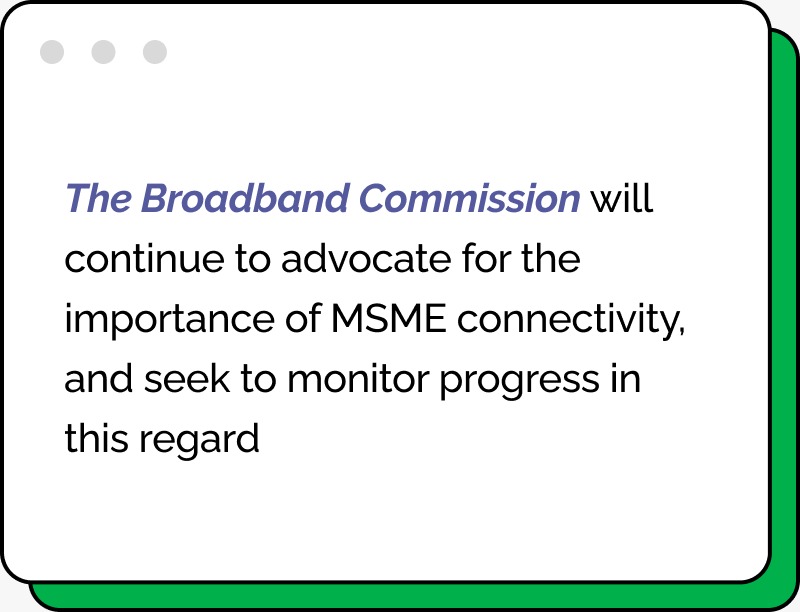
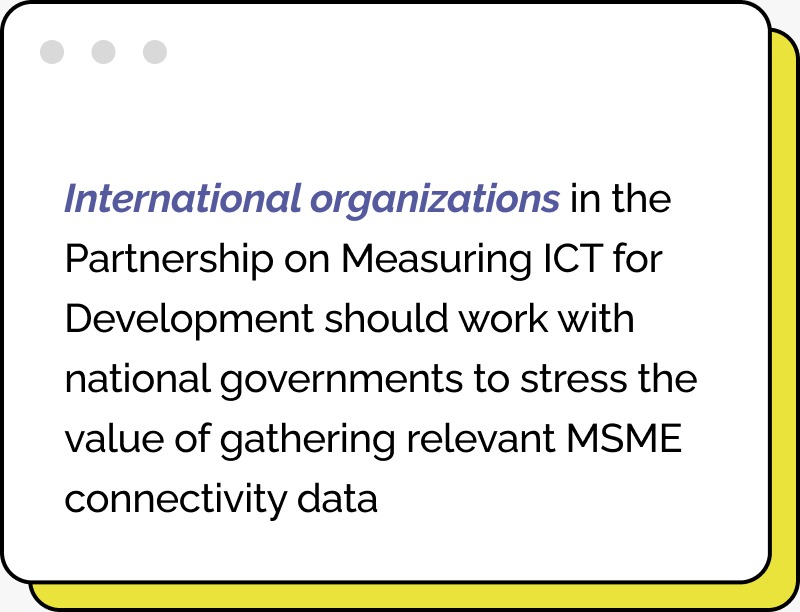
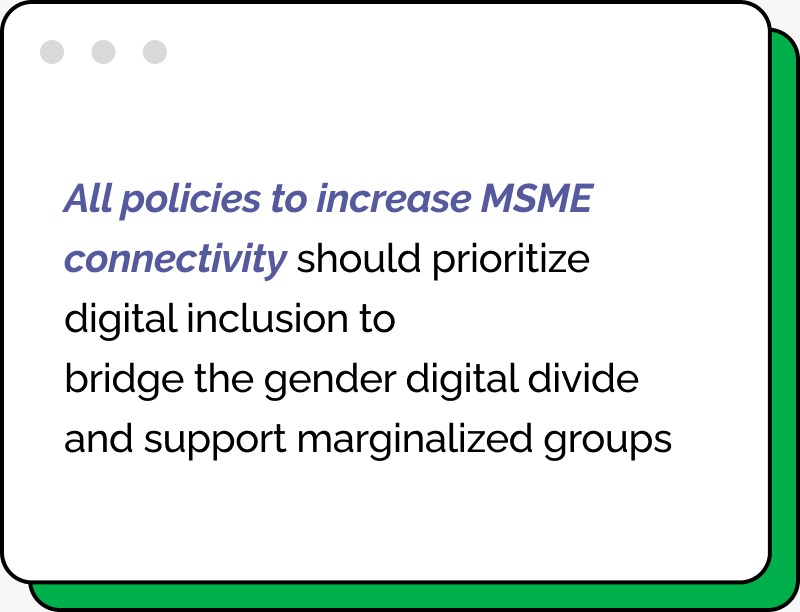
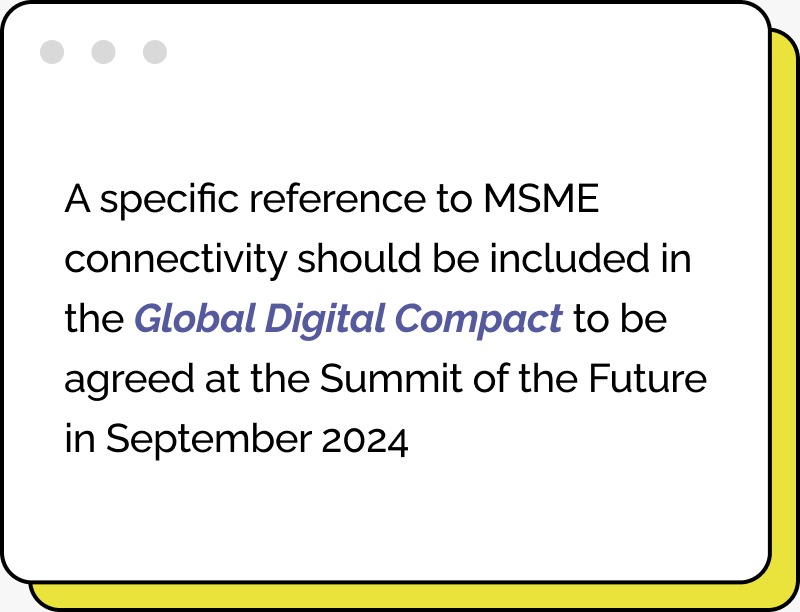
The Working Group Model
Composition and Activities
- ITU
- Rwanda, Ministry of ICT
- Mr. Mauricio Ramos, Millicom
- Mr. Pekka Lundmark, Nokia
- Mr. Lacina Koné, Smart Africa
- Vodafone
- Mr. Carlos Jarque, America Movil
- Mr. Achim Steiner, UNDP
- Ms. Rabab Fatima, UN-OHRLLS
- Mr. David Wajsgras, Intelsat
- Mr. Andrew Sullivan, ISOC
- Dr. Qu Dongyu, FAO
- Mr. Denis O’Brien, Digicel
- Mr. Ralph Mupita, MTN
- Michael Kende
- Visa: Amina Tirana, Carl Manlan
- University of Pennsylvania: Prof. Christopher Yoo
- Mastercard: Neha Gandhi, Nicola Villa
- UPU: Paul Donohoe, Juan Moroni, Houssem Gharbi
Additional experts providing feedback
- Liquid Telecom: Ben Roberts
- Alibaba Group: Xing Yue, Yu Bo • Busu Naturals: Ms. Emma Omany
- Zain: Andrew Arowojolu Hamad Al Marzouq
- UNCDF: Jessica Massie
- Africa118: Ezana Raswork
- Google: Michael Murungi, Sinmisola Nojimu-Yusufou
Focus Area
Resources
Co-Chairs
Ms. Pamela Coke-Hamilton
Executive Director of ITC
Mr. Mats Granryd
Director General of GSMA
Broadband Advocacy Targets
SDGs









